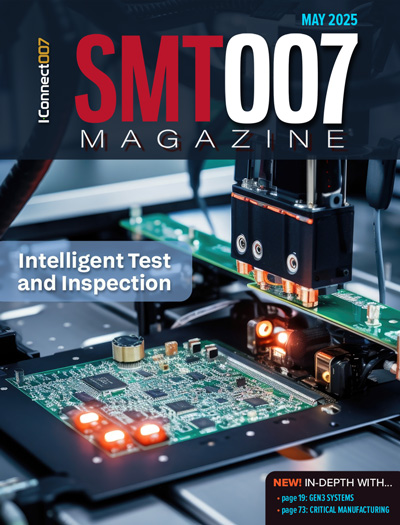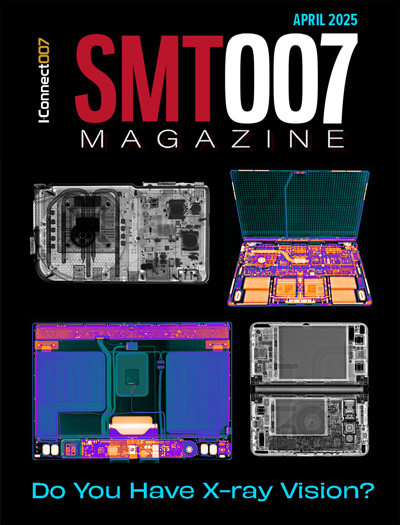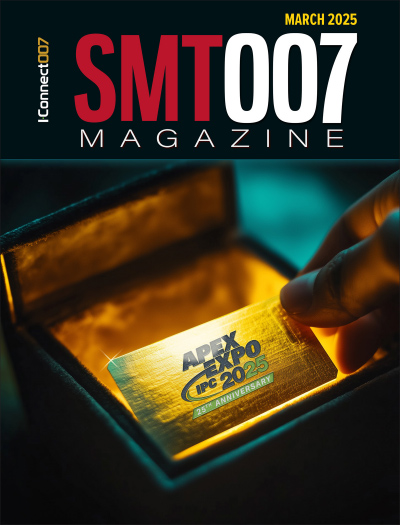-

- News
- Books
Featured Books
- smt007 Magazine
Latest Issues
Current Issue
Intelligent Test and Inspection
Are you ready to explore the cutting-edge advancements shaping the electronics manufacturing industry? The May 2025 issue of SMT007 Magazine is packed with insights, innovations, and expert perspectives that you won’t want to miss.

Do You Have X-ray Vision?
Has X-ray’s time finally come in electronics manufacturing? Join us in this issue of SMT007 Magazine, where we answer this question and others to bring more efficiency to your bottom line.

IPC APEX EXPO 2025: A Preview
It’s that time again. If you’re going to Anaheim for IPC APEX EXPO 2025, we’ll see you there. In the meantime, consider this issue of SMT007 Magazine to be your golden ticket to planning the show.
- Articles
- Columns
Search Console
- Links
- Media kit
||| MENU - smt007 Magazine
Enabling a New Paradigm for Flexible, Point of Need Design and Manufacturing
March 18, 2024 | DARPAEstimated reading time: 1 minute
The Department of Defense (DOD) needs the flexibility to manufacture critical structures at the time and point of need using locally available materials. Yet current manufacturing approaches for forward production operate under the assumption that pristine raw materials will be readily available; furthermore, any change in material input would require costly redesign. This means that structure designs are reliant on fixed inputs to produce fixed outputs, hindering the flexibility required for forward production where raw materials and resources are limited.
DARPA’s new Rubble to Rockets (R2) program aims to overcome current limitations to manufacturing in supply chain-denied environments by developing production and design approaches that can accommodate widely variable input materials. Performers will focus on creating an inexpensive, flexible, and robust platform for the production and characterization of raw material for use in structural fabrication. They will then seek to apply that platform to adaptively update a sounding rocket’s structural design.
“Existing manufacturing approaches require stability. Building a framework that can enable the manufacture of structures out of anything, anywhere, and at many sizes would break the status quo for manufacturing in resource-contested environments,” said Hunter Martin, DARPA’s program manager for the R2 program. “We’re focusing on sounding rockets for proof of concept because they represent a single-use structure with multiple components and complex structural requirements, but anticipate broad applicability to a wide range of manufacturing use cases – from spare parts and infrastructure repair to system production.”
R2 will also look to leverage material informatics and innovative processing and manufacturing techniques to dramatically drive down the timeframes and scale needed for production.
DARPA hypothesizes that the analytical framework R2 aims to develop would allow for rapid upgrades to incorporate the growing number of new material developments and fabrication methods, thus significantly reducing adoption risk that traditionally can take decades to retire. Additionally, advances in material conversion and learnings from the program may open entirely new spaces for highly available material with a lower-risk supply chain and energy footprint.
DARPA will share further details on R2 in a forthcoming Program Solicitation (PS). An R2 Industry Day is scheduled for Mar. 18, 2024, to provide information to potential proposers on the objectives of the program.
Suggested Items
SMC Korea 2025 to Spotlight Next-Generation Memory and Materials Innovation amid AI Boom
05/13/2025 | SEMIThe Strategic Materials Conference (SMC) Korea 2025 is set to convene on May 14 at the Suwon Convention Center in Gyeonggi-do, South Korea, bringing together leading experts and innovators to highlight the critical role of materials innovation in addressing the performance, efficiency, and scalability requirements of AI-enabled semiconductor devices.
SEMI Applauds New Bill to Clarify Tax Credit Eligibility for Critical Semiconductor Suppliers Under U.S. CHIPS Act
05/12/2025 | SEMISEMI, the industry association serving the global semiconductor and electronics design and manufacturing supply chain, announced support of the Strengthening Essential Manufacturing and Industrial Investment Act (SEMI Investment Act), which clarifies that critical materials suppliers to semiconductor manufacturers are eligible for the Advanced Manufacturing Investment Tax Credit (“Section 48D”) created by the United States CHIPS and Science Act.
Taiwan's PCB Industry Chain Is Expected to Grow Steadily by 5.8% Annually in 2025
05/05/2025 | TPCAAccording to an analysis report jointly released by the Taiwan Printed Circuit Association (TPCA) and the Industrial Technology Research Institute's International Industrial Science Institute, the total output value of Taiwan's printed circuit (PCB) industry chain will reach NT$1.22 trillion in 2024, with an annual growth rate of 8.1%.
New Database of Materials Accelerates Electronics Innovation
05/05/2025 | ACN NewswireIn a collaboration between Murata Manufacturing Co., Ltd., and the National Institute for Materials Science (NIMS), researchers have built a comprehensive new database of dielectric material properties curated from thousands of scientific papers.
DuPont Exceeds Quarterly Profit Expectations as Electronics Segment Benefits from Semiconductor Demand
05/05/2025 | I-Connect007 Editorial TeamDuPont reported higher-than-expected earnings for the first quarter of 2025, supported by increased demand in its electronics and industrial segments. The company’s adjusted earnings per share came in at 79 cents, surpassing the average analyst estimate of 65 cents per share, according to data from LSEG.


